#Culture
Ouroboros, Part 14 – Country of Ghosts
Hassan looked to the driver. “How do you stay in this country of ghosts?” The driver shrugged. “This is our home,” he said. “The ghosts are part of the family.”
Published
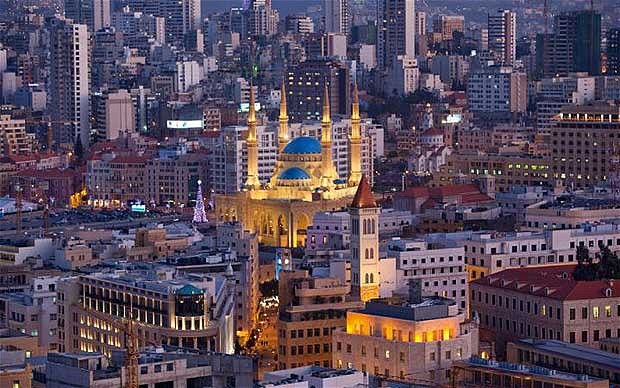
See the Story Index for a chronological guide to the previous stories.
Keep supporting MuslimMatters for the sake of Allah
Alhamdulillah, we're at over 850 supporters. Help us get to 900 supporters this month. All it takes is a small gift from a reader like you to keep us going, for just $2 / month.
The Prophet (SAW) has taught us the best of deeds are those that done consistently, even if they are small. Click here to support MuslimMatters with a monthly donation of $2 per month. Set it and collect blessings from Allah (swt) for the khayr you're supporting without thinking about it.
Previous chapters of this story: Ouroboros Introduction | Part 1 | Part 2 | Part 3 | Part 4 | Part 5 | Part 6 | Part 7 | Parts 8 and 9 | Part 10 | Part 11 | Part 12 | Part 13
Three Months Later – Summer of 2012
Hassan dug his toes into the sand and braced for the wave. The frigid water ebbed and surged around his waist as a biting wind blew in from the east. Without a wetsuit he could only stand the water for ten minutes at a time.
The wave came like a big blue hand, ready to slap him down for having the temerity to cheat death once again. He held his breath, ducked his head and bent his knees as the wave crashed into him. The muscles of his thighs and calves strained, but he held his footing. He breathed, let the salty ocean water stream from his face and hair, and waited for the next wave.
In his decades of martial arts training he’d performed many exercises to develop balance and strengthen his legs, but he’d never come across a better one than standing up to ocean waves. It was the ultimate full-body endurance exercise.
He didn’t always manage to stay on his feet. Yesterday he’d been knocked over by a huge foam-topped wave, become disoriented and swallowed so much seawater that when he surfaced he vomited.
Jamilah and the others kept telling him that he was pushing himself too hard, too soon. But he had no time to waste. He’d spent two years of his life lying in a bed like a living corpse, his mind cowering in a dungeon of his own making. After he woke up it was a week before he could speak, and another week before he could walk unassisted. He had enemies out there who wanted to kill him. He couldn’t afford to take his time.
Yes, Jamilah had informed him that Boulos was dead, and even showed him the headline. She tried to get him to read the entire story, and to read about the Mission Street Massacre and the events in Oakland as well, but he refused. The very thought of reading about those events repelled him. He didn’t want or need to know. He didn’t remember anything of the last seventeen years and he was fine with that.
Brother Muhammad Saleh had briefed him on the details on his life as he himself had apparently narrated them: Lena’s death, his own emotional breakdown and stay in a mental asylum, his years in prison, then his release, finding his father’s hidden wealth and effects, and his life as a bike messenger in San Francisco, of all things. Then there were the events of two years ago: the death of his friend Layth – who he did not remember at all – and the confrontation with Sarkis and this Crow character, who had turned out to be Charlie come back to life, along with the revelation that Lena might still be alive…
Hassan shook his head. It was all too fantastical. He couldn’t have come up with a more bizarre life story if he tried. Not that he imagined Jamilah or Muhammad were lying. No, their love and concern was palpable. And he had to admit that his “story” bore a kind of inexorable logic. He could see his life following such a dark path if all the things he feared most had come to pass.

He especially did not want to think about the claim that Charlie had survived and been turned into an assassin, and then was brain damaged. The idea wounded him. He wished Muhammad and Jamilah had not told him that. What was he supposed to do with that but suffer?
When he was out here moving, fighting the waves, running and training, he had a few hours of peace. When he pushed his body to the brink of collapse, it incinerated his thoughts like letters in a fireplace, so that all that remained was the motion. Al harakah barakah.
When he began to shake with cold, he came out of the water and ran to the spot on the beach where he’d left his shoes and shirt. Throwing on the shirt, he sprinted as fast as he could along the waterline where the sand was firm, slowing every few seconds to throw a striking combination or a kick. Whatever else he’d forgotten, he seemed to recall his martial training. Alhamdulillah for everything. What had happened had happened for a reason. Just as the Prophet sal-Allahu alayhi wa sallam said to ibn Abbas, what befell him was not going to pass him by, and what passed him by was not going to befall him. He’d come to terms with Charlie’s disappearance, his own life as a soldier, the horror of Tel-Az-Zaytoon…
He shouted his thoughts into silence, dove into the air and came down in a perfect roll, somersaulting back to his feet picking up his run without pause. Sea gulls scattered before him, taking to the air with raucous complaints, while shore birds darted away on long legs, leaving three-toed tracks in the sand.
This was an isolated cove that he’d discovered a half mile north of the clinic. It was accessible only by a steep path – down on all fours kind of steep, hanging onto tree roots at times – that switchbacked its way down the cliffside from the headland above. As far as he could tell, no one else ever came here.
Aside from Jamilah of course. Slowing from his mad dash, throwing his head back to suck in air, he spotted her high at the top of the cliff. She sat cross-legged, a shawl pulled around her shoulders and neck, watching. He didn’t mind. She worried. He knew that she was waiting for him – had waited for two years, in fact. He knew, for he had been told by Muhammad and others, that she had been more loyal and dedicated than he had any right to expect. He knew that she envisioned a future with him as her husband. Not even a future, in fact – she wanted it in the present. She was ready now.
He could not do it.
It wasn’t that he didn’t love her. He still remembered her from his dreams, standing over him, ready to protect him with her life’s blood. Sometimes it felt like Jamilah was the only constant in his life, the only connection to his past, and the only person he knew in his bones that he could rely on. He’d seen the way it hurt her when he awakened from the coma and asked for Lena. He was sorry for that. He never wanted to cause dear Jamilah a sliver of pain.
Nevertheless, there were something that he had to do first. Something that could not be ignored.
His mind went now to the last clear memory he had of his past life. The brain was a strange thing, because with all that he had forgotten, he could remember the trip to the Topkapi Palace like it was yesterday:
Hassan had Tuesdays and Wednesdays off from the Golden Door, but he rarely enjoyed his free time because Lena was often sick, tired or in a bad mood. On this particular day though, she’d been in one of her rare happy moods, so they’d gone to the Topkapi on a lark. Hassan wanted to see the cloak and sword of the Prophet Muhammad, sal-Allahu alayhi wa sallam, while Lena was eager to see the huge collection of Ottoman artwork.
It was a beautiful summer day when they disembarked from the bus. The sunlight filtered emerald through the leaves of the tall trees around the palace. As they approached the Topkapi’s entrance – a huge stone doorway with towers on each side and battlements above – a flock of black cormorants flew over their heads, calling out in their stuttering, dinosaur-like voices, on their way to dive for fish in the Bosphorus below.
The Topkapi – a museum now – served as the royal residence of the Ottoman sultans for four hundred years. A sprawling complex sitting atop a promontory on the Golden Horn, it had once housed four thousand royal servants, administrators and guards.
The opulence was staggering. Outside were lush lawns and fountains, with flamingos strutting unmolested. Inside, hectares of pavilions and rooms covered in brilliant, intricate hand-painted tiles competed for attention with four masjids, massive kitchens, an armory, hospital, treasury, bakery, mint, a room full of beautifully painted porcelain, costumes, clocks, jewel-encrusted daggers, portraits of the sultans… it went on and on.
While Lena gazed in rapture at the ancient and beautiful works of art, Hassan gazed at her, following the line of her jaw with his eyes, the blue vein that ran beneath the skin of her temple, the way even now her thin shoulders caved slightly forward, as if she were subconsciously warding herself against a blow. The happiness in her eyes at this moment captivated him. Ever since he’d found Lena in Turkey, his greatest wish had been to see her well again. Her moments of happiness were fleeting; witnessing one was like sighting a rare bird. He felt that he would give up so much – the promise of wealth or fame, years of his life, even his hope of one day having children – if he could just see her content, healthy, and happy.
The only time he was able to take his eyes off his wife was when they came to the decorated chambers of the sacred relics of the Prophet, sal-Allahu-alayhi wa sallam. These items had been dispatched to Istanbul during the reign of the Ottomans, and were considered authentic. There was a wool mantle that the Prophet had owned and worn and later given to Ka’b bin Zuhayr, who sold it to Mu’awiyah I.
There was a battle flag that had been the turban of Buraydah ibn al-Khasib, an enemy who was ordered to attack the Prophet but instead bowed to him, unwound his turban, fixed it to his spear, and offered himself to the Prophet’s service. The flag later served as a curtain over the entrance to Aisha’s tent.
Other relics included a tooth lost by the Prophet at the battle of Uhud, as well as swords, a bow, and sandals that had all belonged to him. There was even a piece of his beard. These items were housed in inscribed containers of gold and clear crystal, so that they could be seen by the public.
Hassan was not one to venerate such items. But seeing them affected him deeply. Being so near to them was, essentially, to be one step removed from the presence of the Prophet himself. The Messenger of Allah, sal-Allahu alayhi wa sallam, was not just a historical figure, and here was the proof. He was a man. Here was the sacred seal that he had used in his ring to stamp documents. There was a wooden bowl that he had eaten from, which was kept by Fatima after his death, and passed to his grandsons Hassan and Hussain.
Leaving the palace, Lena was enthused, gabbing excitedly about what she’d seen, but Hassan felt humbled and subdued, almost as if he had visited with the Prophet himself. He could close his eyes and imagine the Prophet wearing those sandals and that cloak, eating from that bowl, wearing that ring.
That was the last memory he had of his old life, and he was okay with that, because it was something he could hold on to and feel content with.
***
Hassan brought his mind back to the present moment. He’d come to a rocky stretch of beach that required more attention to his footing. All along this stretch, large boulders had tumbled from the mountains above. Some lay singly on the sand like eggs deposited by gargantuan turtles. Others were piled in random formations.
A family of sea lions sunned themselves blissfully on the sand. They raised their heads and regarded Hassan as he ran by, then went back to their sunbathing. They made Hassan think of children watching a fire truck speed past.
He scrambled onto an isolated boulder and began practicing combinations on its smooth top. Inside leg kick, slap to the back of the neck, reap the leg, hammerfist. Right uppercut elbow, right descending elbow, push the head away, palm strike, catch the head, elbow. Front kick, side kick, roundhouse kick, spin kick. He moved faster and faster, pushing himself as if his life depended on it, gasping for breath, repeating the combinations until his limbs became a blur.
He leaped from the boulder, dropping into a roll when he hit the sand, then climbed up a jumbled pile of rocks, pausing every few seconds to throw a combination. As he hopped down from the top of the pile to a lower rock, the strength in his legs suddenly gave out.
He put up his hands to break his fall but it wasn’t enough. He struck his head hard on the side of the rock and felt an explosion of pain in his skull. He cradled his head in his arms and rolled off the rock onto the sand below. When he finally recovered to his hands and knees, he saw blood dripping from his head onto the sand.
He struggled to his feet and found that his legs held. As he turned in a circle, trying to orient himself, he saw a glint of reflected light from the clifftop about a quarter mile north, shining through the branches of a copse of bishop pines. He froze, scanning the distant trees. A reflection like that would have come from glass. It could be a gun’s telescopic sight. Or, he conceded to himself, binoculars. Maybe some tourist watching the sea. Or even just the glint of someone’s eyeglasses catching the sun.
Regardless, it was out of place here. No one ever came out here. The cliffside trail was some distance from the highway, and there were no side roads. Hassan himself had found this cove only by hiking north along the headland from Salsabil.
His phone rang. Feeling a thud of pain in his head with every step, Hassan jogged quickly to his shoes, inside which he’d tucked the phone that Muhammad had given him. He didn’t care much for phones, but Muhammad had insisted he carry it at all times, and he’d agreed. Snatching the phone out of his shoe, he answered Jamilah’s call.
“I’m coming down,” she said.
Hassan shot a glance to the steep path that laddered down to the beach from the cliff. Jamilah was already on it, trying to climb her way down, and talking on the phone at the same time.
“No! Go back up. The trail isn’t safe. I’m fine, okay? I’m coming up now.”
Jamilah let out a deep breath of what might have been relief or frustration. “Hassan, you can’t keep doing this!”
“I know,” he promised. “I’ll see you in a bit.”
***
Hidden among the trees, Hamdi quickly packed up his field binoculars and began breaking down the SVD. As he did so, he admired yet again the workmanship of this versatile weapon. The Snayperskaya Vintovka Dragunova – Dragunov Sniper Rifle – was an old Soviet squad support gun that doubled as a sniper or marksman rifle.
The Dragunov didn’t have the fantastic range or accuracy of some of the newer sniper rifles, but it offered other advantages. Semiautomatic, featuring a wooden handguard and a skeletonized wooden stock, the Dragunov was lightweight and physically beautiful. It was like a bigger, badder version of the AK-47. This model fired specially designed steel-core cartridges that would drop a Cape Buffalo at three hundred meters.
Hamdi had to hand it to the Soviets. When it came to practical battlefield tech, they were the masters on whose shoulders everyone else stood. Or the conquerors at whose feet everyone lay dead – it was a matter of perspective.
For a moment Hamdi had been afraid that Hassan Amir had spotted him. The man’s recovery was remarkable. As for his skills… Hamdi, who had been trained by the best combat experts in the world and who prided himself on his ability, had never seen anyone move as fast or fluidly as Hassan. True, his legs had given out on him at the end, but that was to be expected. What would he be like in a few months, when he had fully recovered his strength?
The word was that Hassan had amnesia. He couldn’t remember his past. Between that and his lingering weakness, he was vulnerable.
***
Muhammad’s office occupied the northwestern corner of the building. The window wrapped around from west to north, offering views of both the mountains and the sea.
“An Arab, an Israeli and a pretty girl are on a train – “ Muhamamad began.
“You already told us that one,” Jamilah interrupted. “It didn’t make sense the first time.”
“I know, but Hassan doesn’t remember it. All my old jokes are new again. It’s fantastic!”
Hassan grinned. He loved this brother. Here the guy sat behind his desk, the bruised-looking skin beneath his eyes betraying his weariness from sleepless nights with baby Anwar, who had a cry like an air raid siren – Hassan knew, he’d heard it – and still he could tell jokes.
To top it off, he was actually a highly competent martial artist. They’d trained together several times in the last month, and Muhammad had been able to exchange with Hassan in the flow at almost full speed. His balance was good, his joint locks precise, and his kicks phenomenal. Since, apparently, I trained him myself, Hassan thought wryly. It was so strange to be surrounded by these people who had been profoundly influenced by him, and who knew him better than he knew himself – yet to him, they were new friends.
Muhammad had actually invited Hassan to live with him, but Jamilah pointed out – rightly – that living in town would make Hassan too visible, and that it was better he keep a low profile here at the clinic. So his old hospital bed had been swapped for a regular twin bed. It was creepy to still be living in the room where he’d lain insensate for two years. It didn’t matter any more, though. He wouldn’t be here much longer.
He cleared his throat. “Guys. I can’t tell you how grateful I am for everything you’ve done. I can never repay you.”
His heart sped up as he shot a glance at Jamilah. He didn’t want to hurt her, but his course was clear as day. Might as well not prolong it. “I have to go to Lebanon,” he said. “I have to find Lena.” He kept his eyes fixed on the ground, unwilling to meet Jamilah’s stare.
“Okay…” Muhammad said slowly. He paused, probably waiting for Jamilah to interject. She was silent, however. “Have you thought this through? What name will you use?”
“My own.”
The silence from Jamilah’s direction was deafening.
“I know that Boulos is dead,” said Muhammad. “But are you confident that you have no other enemies? What about the Kopis? The cops never found Mr. Black’s body, you know.”
“Let them come.” Hassan’s mouth was chiseled in stone. “No more hiding. The last name I remember using is Hassan Sulayman, but you two tell me that I’ve been Hassan Amir for what, almost two decades? That’s fine. I’ll honor my childhood friend. I am Hassan Amir, until I die.”
“You’re not well,” Muhammad pointed out. “You don’t remember two thirds of your life. You want to return to a troubled and violent region of the world, to find a woman who may or not be alive, all based on unreliable information and partial memories.”
Hassan finally mustered the courage to look at Jamilah, only to find that she had turned away in her seat and was gazing out the window at the mountains, seemingly uninterested in the conversation. Suddenly she rose.
“Fee aman-illah,” she said softly, looking at the ground. “Go in Allah’s care, and may you find what you seek. I’ll wait to hear from you.” She walked out.
Hassan stood and took a step after Jamilah, wanting to call her back, wanting to change his mind and abandon his plans…he could still recall the darkness in which he’d languished for two years – that wrenchingly lonely mental pit, and the black ocean on which he’d floated. It was a real memory to him. He remembered the sense of a loving presence in the darkness, and how that presence had lessened his terror and ultimately saved him. He remembered the lit path that appeared, guiding him back to life. Jamilah said it was the girl, Munirah, who laid that path, but Hassan knew better. Jamilah was the light and the warmth that saved his life.
He owed Jamilah. More than that, he liked her… and he loved her. He wouldn’t be honest with himself if he didn’t admit that. And if you couldn’t be honest with yourself then you were doomed.
“Have you thought,” said Muhammad, “about visiting Charlie before you leave?”
Hassan took another clumsy step after Jamilah, then stopped and watched her walk away. He couldn’t ask her to wait for his return. What if he found Lena? What would he do? He didn’t know. Because he cared so deeply for Jamilah, he would not lie to her.
“Hassan?”
“Huh?”
“Have you thought about visiting Charlie?”
Hassan shuddered. “That’s not Charlie. I mean… no. I find it hard to accept that this brain-damaged assassin is Charlie.”
“You don’t believe Jamilah?”
“SubhanAllah, it’s not that. But how would she know Charlie?”
“Hassan. You know perfectly well that Jamilah says that you said it was Charlie.”
“Well. I don’t remember it.” Hassan felt increasingly agitated. How could some vicious assassin and torturer be Charlie? It didn’t make any sense. And if it was true, that meant that he’d abandoned his little brother to a terrible fate. It was unthinkable, so he didn’t want to think about it, and he didn’t care if that made him unreasonable or in denial or whatever.
“Plus,” Hassan pointed, out, “how could I get permission to see him? He’s in a secure facility. No. Just leave it alone, okay?”
***
The taxi driver left the windows open to the sounds and scents of Beirut. Hassan didn’t mind. Summer in Beirut could get warm, but the sea breezes made it tolerable and kept the air clean. Below the fresh scent of sea salt, Hassan smelled grilling onions and lamb. They turned a corner, and the aroma of jasmine touched him like a kiss.
The streets were packed with cars that honked incessantly, while the sidewalks bustled with men and women carrying shopping bags or strolling in groups, talking. The women were slender and dark haired, and impeccably put together. Hassan had forgotten how obsessively beautiful Lebanese women could be.
Everything seemed new. The destroyed buildings, shell-pocked facades, burned out cars, and the wild vegetation that had marked the Green Line – they were all gone. Hassan recognized nothing. It was as if the Beirut of his memory had been erased. He had no idea where he was. How could the city have changed so much in twenty years?
Beside the driver sat a tiny old man with a shock of white hair. His wrinkled arms and hands looked like thousand year old leather. A beautifully carved hardwood cane rested on the seat beside him.
The driver himself, a grizzled middle aged man with a five day beard, called back to Hassan. “Where do you want to go?”
Between the unlit cigarette dangling from the driver’s mouth and the Lebanese pop that blared from the taxi’s speakers, Hassan could barely understand the man. “Would you turn the radio down?”
“What?”
“The radio!”
The volume descended to a tolerable level. “I’m hungry,” Hassan said. “Can we stop for something quick?”
“Sure, but if you want me to wait I charge fourteen dollars American per hour.”
“We had a huge rainstorm last week, young man!” the tiny senior citizen said. “You missed it. The streets turned into rivers. The next day they caught a mermaid prostituting in Junieh.”
The driver made a shushing gesture at the old man. “My father-in-law,” he said apologetically. If I leave him at home he wanders off and gets lost.”
Hassan handed sixty dollars over the back of the seat. “When that runs out let me know.”
“Ho ho!” the driver exclaimed. “You strike it rich overseas? You came at the right time. Beirut in summer is heaven. International cuisine, parties all night long, beautiful ladies in bikinis on the beach, music festivals, any type of liquor you could want… Whatever pleasure you seek, you can find it here.”
“He doesn’t do those things,” the old man said. “He is a good boy, even if he is a hippie. I can tell.”
Hassan sat back in the seat and looked out the window. Was this what he had fought for? Was this what so many thousands died for? The right to party all night long? He knew the driver was Muslim – a sebha dangled from the rear view window, swinging wildly as they dodged traffic – but he didn’t talk like one.
“I don’t want anything fancy,” he said. “Just some good street food.” Street food was what he’d survived on as a soldier. The militias had not provide their fighters with rations during the civil war. Instead, the soldiers set up checkpoints and charged “taxes” to raise funds. Of course many soldiers went too far and extorted people mercilessly.
Hassan’s own squad had indeed charged taxes from time to time, but more often they’d worked for the money. They’d take a few hours each day to help shopkeepers pile sandbags, clean up the wreckage from a car bomb, do a little construction or repair work… and then head to the food stalls. Hassan had loved the shawerma, shish kebab, fried cauliflower rolls, kebbe, falafel, and, when he could afford it, badem tatlisi – little honey-soaked cakes with almonds. Oh, and in winter, sahlab – hot milk infused with the flavor of rose petals or orange blossoms.
“What’s your name?” the driver asked.
“Hassan.”
“Oh, you are Muslim ma-sha-Allah. And your father’s name?”
This was the Arab way, Hassan knew. You never knew a man until you knew his father, his clan, and his tribe.
“Let’s just say my father was a good man who is no longer with us.”
The driver nodded sagely. “Allah yarhamuh. It is good to be cautious in this country.”
As they threaded their way through Beirut traffic, another driver cut them off. The old man in the passenger seat put his arm out the window and made an obscene gesture. “Son of a dog! Double curses on all who bore you.”
Belying the new prosperity were the checkpoints. In some places tanks were stationed in the streets. Barbed wire cut off entire neighborhoods, and one could pass through only by stopping at a checkpoint manned by armed soldiers who checked everyone’s IDs, glanced inside the car, and occasionally looked in the trunk. The first time they were stopped, Hassan was alarmed.
“What are these checkpoints for?” Hassan asked.
The driver shrugged. “It’s normal, my friend. Don’t worry. Beirut is a peaceful city. Violence is very rare.
“Then these checkpoints don’t make sense.”
“Stop spreading propaganda,” the old man said to the driver, poking him sharply with one finger in the side of the head as the driver tried to swat his finger away. “The hippie is too smart for that.” The old man looked back at Hassan. “It’s all about controlling the Palestinians, son.”
Hassan felt his stomach drop. “Still?” he said. He remembered all too well the way Palestinians had been targeted at Phalangist checkpoints during the war. At some checkpoints, every civilian who tried to pass was given the “tomato test”.
The Palestinian and Lebanese dialects were similar, but there were subtle differences. The checkpoint militiamen would hold up a tomato and ask the traveler to name it. If the person said, “banadora”, they were allowed to pass. If they used the Palestinian pronunciation of “bandora”, they would be dragged off for interrogation – or simply shot dead on the spot. Women would be raped first and then killed. Hassan knew of one checkpoint were Palestinian men were tied to two jeeps by their legs and then torn in half.
The driver eyed Hassan in the rear view mirror. “It’s not like during the war,” he said. “They just get turned back.”
Hassan struck the door with the heel of his palm. “But why? Why won’t the world leave them in peace? When will people stop taking their land, bombing them, and walling them in?”
“There are too many of them in Lebanon,” the driver said. “Four hundred thousand. Our native Lebanese population is only four million. Some are afraid the Palestinians will take their jobs.”
“Nonsense!” the old man said. “It is apartheid! The Palestinians are banned from twenty five professions. They don’t receive work permits. They are banned from Lebanese schools and hospitals. They are not allowed to own property or build in their camps, even Nahr al-Bared that we bombed in 2007. They would starve if not for the U.N. It’s a crime.” He shouted out the window and waved his fist. “A crime! Aren’t they Muslims like us? Is this how we treat our brothers?”
“Pop!” the driver gripped the old man’s arm and gently pulled him away from the window. “He’s right of course,” the driver said to Hassan. “In fact, their being Muslim is a strike against them. If the Christian power structure were to grant the Palestinians citizenship it would tilt the population balance further in favor of the Muslims. They won’t allow that.”
Hassan waved his hand to terminate the discussion. He thought of the Palestinian children in their camps, dressed in rags, playing amid the rubble. What future would they have? How long would this intolerable situation continue? When would the Palestinians have the same rights as any other people on earth – the right to work, build, and strive for happiness?
He sat back in his seat and turned his attention to the road, watching the buildings and pedestrians as the car dodged traffic, trying to recognize something familiar in this crazy city. As they rounded a corner, he saw something that jogged his memory. He pointed. “Is that the same Horseshoe from the old days? Is this Hamra Street?”
The driver sighed. “Indeed. This is the new Lebanon. Hamra used to be the intellectual capital of the Arab world. Journalists, poets, exiles, thinkers – you’d see them at Mondo Café, Wimpy, Café de Paris, Movenpick, Eldorado. Now look.” He waved his hand dismissively. “Starbucks and the Gap. The Horseshoe is the holdout. And no one talks anymore. They’re on laptops and iPads.”
“Shut up,” the tiny old man said. “You don’t know what you’re talking about. Intellectuals? Stingy lunatics! Talking all day, not spending money.”
The driver nodded to the old man. “He used to own the Café Mode. Lost it ‘95. Before that he was a police captain. I was a cop, myself. Twenty years on the force, until I had to retire.”
“What happened?”
“Got shot in the hip by a drug dealer.”
“Stop the car!” the old man shouted. He pointed to a busy shop. “Just what you ordered, young man.”
The driver swerved and stopped in front of a tiny restaurant that served shawerma on a to-go basis only. You could watch them preparing it through a large window. Hassan saw beef, chicken and even fish roasting on large spits that turned in front of an open flame. It wasn’t exactly street food, but it looked and smelled irresistible.
When they exited the car, Hassan saw to his surprise that it was the driver who needed the cane for support, not the old man.
Hassan ordered beef shawerma for all three of them. When he tried to pay, however, the driver put a restraining hand on his arm.
“I’m your customer,” Hassan objected. “Let me pay.”
“Wallahi, I am paying,” the driver insisted. “We are your hosts. Have you forgotten the rules of Arab hospitality?”
Hassan let it go. As he watched, the cook shaved the meat with a sharp knife, allowing it to fall into a circular tray, then scooped it into an open Arabic bread sandwich, garnished it with a slew of toppings including veggies, red pepper and tahini, and rolled it tightly. Lastly, he dipped the wrap back into the beef fat dripping from the skewer and briefly seared it against the flame. It was served with crisp french fries that tasted homemade.
Before eating, Hassan said a quick dua’. “Allahumma barik lanaa feema razaqtana wa qinaa athaab an-nar.” O Allah, bless us in what You have provided for us, and protect us from the torment of the fire. The two older men looked at him with newfound respect.
“I told you he was a good boy,” the father-in-law said.
The three of them stood on the sidewalk eating, too busy chewing to talk. The sandwich was the most delicious thing Hassan had ever eaten in his life.
Across the street, a mural was painted on the side of an apparently empty apartment building. It depicted a black woman in a suit swooning into the arms of a tall bald man with big ears. The mural was marred by bullet holes. It was the first thing Hassan had seen that reminded him of the old days.
“Who’s that supposed to be?” he asked.
The taxi driver grunted. “That is Condoleeza Rice in the arms of Ehud Olmert. That building will be torn down, you can be sure. An ugly skyscraper will go up in its place.”
Hassan did not know who Rice or Olmert were, but did not want to reveal his ignorance.
“Good!” the old man piped up. “What did our generations bring but destruction? Let it all be erased. Anyway, I’ll tell you a joke.”
“That’s alright pop,” the driver said. “Hassan doesn’t want to hear it.”
“No, go ahead,” Hassan said.
The old man grinned with glee, threw his sandwich wrapper in a nearby trash can, and rubbed his palms together.
“Olmert was sitting in his office,” the old man began, “Wondering how to invade Lebanon, when the telephone rang.”
Hassan gathered from this that Olmert was an Israeli leader or general.
“‘It’s Abul Abed,’ the caller said. ‘I am calling to tell you that we are officially declaring war on you.’”
Hassan was at least familiar with Abul Abed, the Lebanese folklore character who figured in so many Lebanese jokes.
“’How big is your army?’ replied Olmert.
‘Right now,’ said Abul Abed, ‘there is myself, my cousin Mustafa, my next-door neighbor Abu Khaled, and the whole team from the tea house. That makes eight!’
‘I must tell you Abul Abed, that I have one million men in my army waiting to move on my command.’
Abul Abed paused, then said: ‘Mr. Olmert, the war is still on! We have acquired some infantry equipment!’
‘And what equipment would that be Abul Abed?’
‘We have two Mercedes sedans and a truck.’
‘I must tell you,’ Olmert said, ‘that I have 10,000 bombers and 20,000 fighter planes. My military complex is surrounded by laser-guided surface-to-air missile launchers. And since we’ve been talking, I’ve increased my army to two million!’
‘Mr. Olmert, we have to call off this war,’ said Abul Abed.
‘I’m sorry to hear that,’ said Olmert. ‘Why the change of heart?’
‘Well,’ said Abul Abed, ‘there is no way we can feed two million prisoners!’”
Hassan smiled and the old man laughed, seemingly delighted to find someone who had not heard his comedy routine before. Hassan wished he could get this guy together with brother Muhammad and watch the jokes fly. They could do an act together and make a mint.
“An Israeli is passing through customs at Heathrow,” the old man continued. “‘Occupation?’ the customs officer asks. ‘No,’ the Israeli says. ‘Just visiting.’”
Hassan smiled again, genuinely amused. The taxi driver looked at him quizzically. “You haven’t heard these? I know you are from here. Your accent is pure Lebanese.”
“No,” Hassan said. “I mean yes, I’m from here, but I’ve been away a long time, and when I was here the guys mostly joked about Muslims.”
The driver arched his eyebrows. “Why is that?”
“Well…” Hassan felt suddenly unsure of himself. How deep did the animosities of the past still run? How much could he reveal? But he’d told Muhammad and Jamilah that he wasn’t going to hide anymore. He was who he was, and he’d done what he’d done. “I was a Phalange fighter,” he said. “I was in the Kataeb.”
The driver and the old man froze, staring. “That’s impossible,” the driver said. “You’re too young.”
Hassan nodded. “I was twelve when I went through training. Fifteen when the war ended.”
“You poor kid,” the old man said. “Children killing children. Allah doubly curse the bastards who started the war and profited from it. But you are Muslim, yes?”
“I am. I converted shortly after the war.”
“Ma-sha-Allah alayk!” the old man said, patting Hassan on the back. “Can you say the shahadah?”
“Don’t be silly, pop,” said the driver. “He’s been Muslim half his life.”
“Ash-hadu an laa ilaha il-Allah,” Hassan said.
The old man completed it for him. “Wa ash-hadu anna Muhammadan ‘abduhu wa rasuluh. The past is the past, eh? If we Lebanese held grudges we would all throw each other from these skyscrapers.” He waved his hand. “Have you been living overseas, hippie?”
“Yes.” Hassan paused. “And I’m not a hippie. Actually, I’ve come back to find someone. I need to hire a private detective.”
The driver nodded. “You’re in luck. Lots of retired cops either go into private security or investigations. I know one myself. Reza Shamsein. A Shi’ah, if that doesn’t bother you. He’s good, but expensive.”
“That’s fine,” said Hassan. “Could you make an appointment for me?”
The driver snorted. “You’ve been away too long, son. What matters here are introductions, not appointments. I’ll take you now.”
Hassan nodded. “I need to make a stop first.”
It took them almost two hours to find the cemetery where Hassan’s parents were buried. Hassan did not remember the cemetery’s name, only that it was slightly north of the city and surrounded by mulberry plantations.
The city had grown tremendously, however. The remaining cemeteries were tiny pockets of open space surrounded on all sides by tall apartment buildings, as if the city were an invading army, and the dead – having already given in to death – were making a truly final stand.
Now and then Hassan recognized a landmark, an intersection, or a building. As they passed through a hilly district, he saw a long flight of stone steps that rose as far as he could see up the side of a hill. The steps began between two large stone buildings, one of which was a church, and were flanked on either side by houses, trees, apartment buildings and metal gates that led into side alleys. In some places the steps were shaded by trellises on which bougainvillea and jasmine grew.
“Stop please!” he said. “Stop.” The taxi stopped, and Hassan got out. He stared up the long flight of steps. A woman swept one of the flat areas that interrupted the stairs periodically. A few small children played hopscotch. Tourists paused to take pictures. A man hawked hot peanuts.
The driver got out of the taxi and stood beside Hassan, leaning on his cane, an unlit cigarette dangling from his mouth. “You want me to take your picture? The view from the steps is wonderful.”
“Are we in Achrafiyeh?” Hassan asked. “Are these the Saint Nicholas steps?”
“Indeed,” the driver said.
Hassan did not respond. The taxi driver followed Hassan’s gaze up the steps, then studied his face. “You have been here?”
“You don’t want to hear it, trust me.”
The driver put his hand on Hassan’s shoulder. “I do.”
Hassan closed his eyes and rubbed his forehead, going back in time to half a lifetime ago. “Do you remember when General Aoun attacked the Lebanese Forces back in 1989?”
“Of course. His so-called war of liberation. The madman attacked everyone, starting with fellow Christians.”
“I was in command of three LF platoons,” Hassan said. “Part of two companies tasked with securing this part of Achrafiyeh. We were based in a square about a kilometer from here. Up the hill that way.” He pointed.
The driver nodded. “Bintein Square.”
“Right, yes, that’s the one. It was early spring, February. Cold. Aoun’s men hit us before dawn, when we were mostly asleep. They opened fire with heavy machine guns and grenades. We were outnumbered five to one. Dozens of men died before they could pick up their weapons. We were on the run from the start, some of the men half naked. Running and firing, men screaming and dropping, and Aoun’s men were after us like jackals. We ran down alleys and cut through empty buildings, over a hundred of us.
“The thing was, every time it looked like there was nowhere to go, there would be one way open. I tried to tell the major, this heavyset bald fellow with a perpetual grin, that we were being herded – but he wasn’t grinning then, he was terrified, and wouldn’t listen. My gunner, a man named Daniel, realized what was happening. He wanted to kill the major so I could take command. ‘Lemme pop his balloon,’ he said. ‘This Barnum Bailey gonna make jam out of us.’”
Hassan shook his head. “Didn’t matter anyway. We came down this one last alley, Aoun’s men still behind us, and there we were on the steps, right about halfway up.” Hassan pointed.
“They were waiting for us. The bottom, this end, was blocked by a tank firing a 105 millimeter cannon. Up at the top, Aoun’s men opened up with a couple of 50 caliber machine guns. They had defilade fire all the way down. There were men on top of the church, throwing down grenades. It was a slaughter. I’m telling you, these steps…” Hassan paused, exhaling loudly. “These steps were a waterfall of blood.”
“How did you escape?” the driver asked.
Hassan snorted. “I don’t know if you’ll believe me. My gunner, Daniel, ripped a sheet of plywood off a boarded up window. He set it on the steps, had me lie on it, then he lay flat on top of me and pushed off. With all the blood on the steps we rocketed down like a toboggan. Slid right under the tank. I came out firing, and Daniel climbed on top of the tank and dropped a grenade through the hatch. We created an opening at this end for our men to escape. Still, only thirty two of our men survived.”
The driver shook his head. “Terrible times. Aoun is an MP now, did you know that?”
“No.”
“All of our war criminals are respectable again.”
“Here’s an irony,” Hassan said. “Aoun and I are related through my mother’s side. He’s an uncle twice removed, or something like that.”
“I am guessing you have not come to Lebanon for an Aoun family reunion.”
Hassan looked to the driver. “How do you stay in this country of ghosts?”
“This is our home,” said the driver. “We Lebanese have a gift for remembering and forgetting at the same time. As for the ghosts…” He shrugged. “They are part of the family.”
***
It was the third cemetery they tried. Like the previous times, the driver and the old man remained in the cab as Hassan wandered amid the graves. It struck Hassan that the residents of the neighboring buildings were lucky in a way. There seemed to be few open spaces left in Beirut. At least these people received sunshine and enjoyed some greenery and the flow of the breeze across the open space of the cemetery.
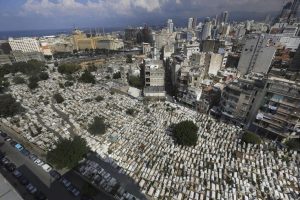
Beirut cemetery
His mother and father lay side by side, though Hassan knew that in his mother’s case, the grave contained only fragments of bone.
Above each of their graves stood statues of elaborately carved stone angels with large, feathered wings. One was male and one female, and they had been positioned so that they faced each other. At the base of each was a marble slab with the name, birthdate and death date of the deceased. There were no inscriptions.
A profusion of white wildflowers grew above and around the graves, reaching two or three feet high, so that the marble slabs were barely visible. Oddly, there were tributes all around his father’s grave: flower bouquets, bottles of liquor, teddy bears gone moldy…
He stood for a long time, not speaking. He did not know what to say. Were his parents at peace? How would Allah judge them? He had to trust that Allah was just and fair, and would be kind to all His creatures. Allah was Ar-Rahman Ar-Raheem.
What could he say to his mother and father to account for himself? How could he explain his failure to protect Charlie? What could he say about his life when he did not remember most of it himself?
He imagined his parents as they had been in life: his father walking with a cane, hobbled by violence but always ready to laugh at his children’s antics; and his mother, beautiful as a queen but moody and unpredictable.
“I love you both,” he said finally. “I’m sorry I’ve been away for so long.” He did not know what else to say, so he repeated himself. “I love you.”
He wondered if he would ever return here. Certainly he would not be buried in this Christian cemetery.That’s the body only, he reminded himself. The soul is another matter. Who could say what Allah would do with them all? For now, he would carry his parents in his heart. He would speak of them with pride, and he would not hide.
As he was about to exit the cemetery he stopped and glanced back in the direction of his parents’ graves one last time. He was startled to see a young, well-dressed man standing before his father’s grave. There was something in his athletic build and posture that spoke of military training. One of his father’s fans, come to pay his respects? Or could he be one of Hassan’s mother’s relatives? Hassan didn’t know that side of the family.
He took a step back toward his parents’ graves, intending to talk to the young man. As he did so, however, the fellow turned and strode away quickly.
Hassan let the man go and returned to the taxi.
The driver started the car. “Next cemetery?”
“No… I found them, jazak Allah khayr. You know, it’s odd. There were tributes all over my father’s grave. Flowers and such. I can’t imagine who might have left them.”
The driver shot him a look in the rear view mirror. Hassan couldn’t quite read his expression. Surprise? Dawning awareness?
“Who was your father?”
Hassan was silent. The wizened old step-father turned in this seat, incensed. “You think if you tell us your family we will kidnap you? My son-in-law is a taxi driver, not a mafia!”
“Hush, pop,” the driver said. “It’s okay.”
Hassan chuckled. “I’m sorry. I’ve had to be cautious, but maybe the time for that is past. My father was Kamal Haddad, the poet and philosopher.”
Driver and father-in-law both turned to regard him. “I thought his children were dead,” said the old man. He tapped his head. “Are you sure you’re not missing some chickens from the henhouse?”
“Shhhh,” the driver said. “Stop.”
The old man turned away, arms crossed in anger. “A man can’t talk anymore. This taxi is a dictatorship on wheels. It should be called DMT – Dictator Muhsin Taxi.”
“You know, son,” the driver said to Hassan, “if you’d told me from the beginning who your father was I would have brought you straight here.”
“I don’t understand.”
“Your father is highly revered in some circles. My kids read his books in school. Two or three times a month I bring passengers here, mostly university students but also intellectuals and even journalists. Some bring tributes, as you said.”
“I didn’t know that,” Hassan said softly.
“I understand why you didn’t want to tell us. The Haddad family is a controversial subject in Lebanon. You’re smart to keep it to yourself.”
***
Reza Shamsein, a heavyset man with acne and a wide grin, leaned forward in his seat and tipped a bottle of liquor toward Hassan. “Pour you a shot?”
“No. Thank you.”
“One of those religious types, are you? Suit yourself. Your first request is easy. I can tell you right now where to find them. May I ask the nature of your business with them?”
“It’s personal.”
Reza studied Hassan. “These are powerful and dangerous people. If you mean them harm, then I cannot be involved.”
“I don’t. You have my word.”
Reza shrugged, as if Hassan had said something inconsequential. But he took out a pad of paper and began to write. “This is the address. They reside in the penthouse flat in a building they own on the Corniche. Extremely expensive area. As you may or may not know, the family owns the Bank of Bekaa. In the last decade they branched out into construction.”
He handed the paper to Hassan. “You will not be able to meet them without an introduction.”
“Let me worry about that. What about the other person I asked you to find? Lena Ayyoub?”
“Still working on it. She’s not in the usual databases. She either doesn’t want to be found, or she’s dead.”
Keep supporting MuslimMatters for the sake of Allah
Alhamdulillah, we're at over 850 supporters. Help us get to 900 supporters this month. All it takes is a small gift from a reader like you to keep us going, for just $2 / month.
The Prophet (SAW) has taught us the best of deeds are those that done consistently, even if they are small. Click here to support MuslimMatters with a monthly donation of $2 per month. Set it and collect blessings from Allah (swt) for the khayr you're supporting without thinking about it.
Wael Abdelgawad's novels can be purchased at his author page at Amazon.com: Wael is an Egyptian-American living in California. He is the founder of several Islamic websites, including, Zawaj.com, IslamicAnswers.com and IslamicSunrays.com. He teaches martial arts, and loves Islamic books, science fiction, and ice cream. Learn more about him at WaelAbdelgawad.com. For a guide to all of Wael's online stories in chronological order, check out this handy Story Index.


[Podcast] Guardians of the Tradition: Muslim Women & Islamic Education | Anse Tamara Gray

Digital Intimacy: AI Companionship And The Erosion Of Authentic Suhba

Starting Shaban, Train Yourself To Head Into Ramadan Without Malice

Far Away [Part 7] – Divine Wisdom

How to Make this Ramadan Epic | Shaykh Muhammad Alshareef

Op-Ed: From Pakistan To Gaza – Why Senator Mushtaq Ahmad Khan Terrifies Power And Zionism

[Podcast] Should Muslims Ally with Conservatives or Progressives? | Imam Dawud Walid

The Muslim Book Awards 2025 Winners

The Sandwich Carers: Navigating The Islamic Obligation Of Eldercare

Keeping The Faith After Loss: How To Save A Grieving Heart

[Podcast] Guardians of the Tradition: Muslim Women & Islamic Education | Anse Tamara Gray

How to Make this Ramadan Epic | Shaykh Muhammad Alshareef

[Dhul Hijjah Series] Calling Upon the Divine: The Art of Du’a (Part 1)

IOK Ramadan 2025: Four Steps | Sh Zaid Khan

IOK Ramadan 2025: Do Your Best | Sh Zaid Khan
Trending
-
#Life1 month ago
Faith and Algorithms: From an Ethical Framework for Islamic AI to Practical Application
-
#Current Affairs1 month ago
An Iqbalian Critique Of Muslim Politics Of Power: What Allamah Muhammad Iqbal’s Writings Teach Us About Political Change
-
#Current Affairs1 month ago
Quebec Introduces Bill To Ban Prayer Rooms On College Campuses
-
#Culture1 month ago
MM Wrapped – Our Readers’ Choice Most Popular Articles From 2025
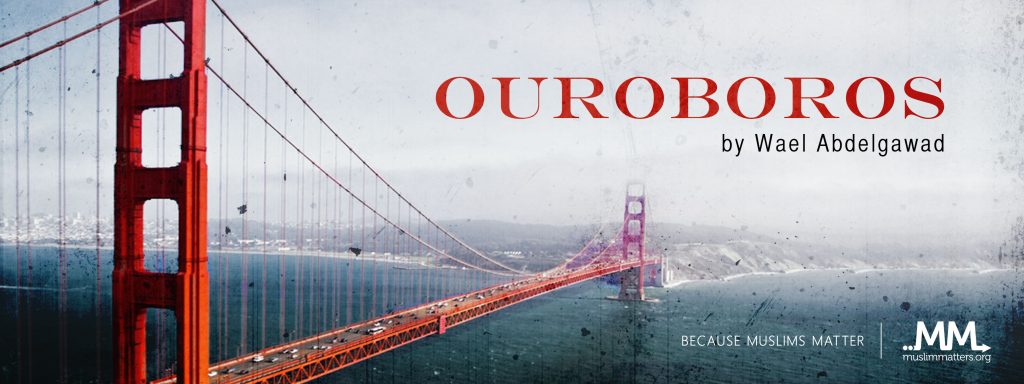
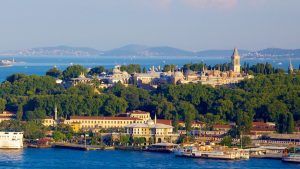
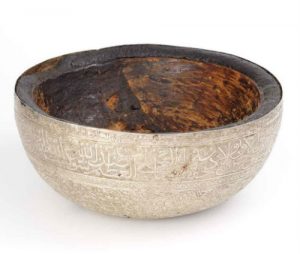


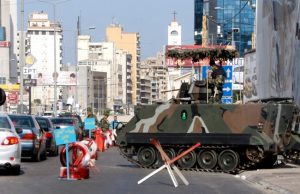
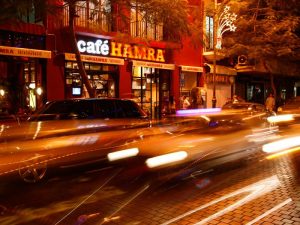
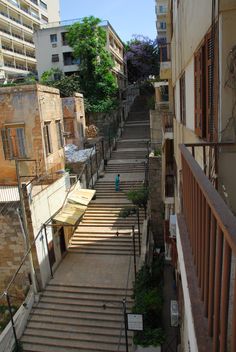





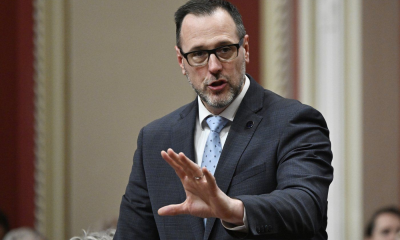



Iffat
December 23, 2015 at 2:55 AM
Wow! This story is beautiful. The conversation b/w the taxi driver, his father in law and hassan is so deep. I mean, they are strangers but they have a connection – the war! Knowing about a different culture , Lebanese, Palestinian … Its so beautiful. alhamdolillah for books! I feel heartbroken for Jamilah, but o guess that’s life. You give your 100% love and dedication to someone, but they give it to someone else. That hurts really bad ! Jazak Allah khair for writing this beautiful beautiful story. I pray Allah gives you many more ideas and years to write more thought provoking books like this. Salam alaikum :)
Wael Abdelgawad
December 23, 2015 at 11:46 AM
Thanks for your lovely comment, Iffat.
Khalida
December 26, 2015 at 6:46 PM
Yes, it’s heart-breaking that Hassan just left Jamilah like that, but you have to consider other perspectives. First of all, wouldn’t it be true loyalty for Hassan to find out if his *wife* (Jamilah is not his wife) even exists? Second, it’s not easy for everyone to just jump into a marriage, especially considering that Hassan has been through so many difficulties in life. In real life, unlike in movies or fiction books, marriage requires preparation of many sorts. I think it’s apt that he understands his own life first, reach resolutions, and create a positive mindset for the future that will allow him to be fully loyal to Jamilah (i.e. if either Lena isn’t alive or she doesn’t want to be in his life). If we bring Islam into this, then keep in mind that Jamilah and Hassan didn’t ever even go through any shar’I method of a proper marriage proposal.
Blue Pilot
December 23, 2015 at 5:48 AM
At least Jamilah can now move on. Maybe the story doesnt end like that, and we’ll see how it does. But she gave her 200% and stayed firn till the end. Now she is free.
I remember that this story is only 16 parts. Im wondering how Lena Charlie Hamdi and Jamilah will all be wrapped up in just 2 more parts.
Safa
December 23, 2015 at 6:19 AM
I believe it has been extended. See the Story Index:
http://muslimmatters.org/about/authors/wael-abdelgawad-story-index/
@Wael Jazakumuallahu khayran as always. Alhamdulilah the novel keeps skipping to a few yrs but seems like Hassan’s storyline is getting drawn out a bit? I guess will have to wait for all the wrinkles to iron out in the next 3 parts.
Wael Abdelgawad
December 23, 2015 at 11:52 AM
I’ve made it 17 parts. Like this chapter, 15 and 16 are quite long.
Taban
December 23, 2015 at 8:16 AM
what about jamilah’s thoughts about hassans going to lebanon …u did not mention that ..i mean from jamilahs point of view…
Wael Abdelgawad
December 23, 2015 at 11:53 AM
That is left to the reader to imagine. There are some clues in her behavior when Hassan tells them he is leaving.
Taban
December 23, 2015 at 12:35 PM
she agreed right but i wanted to know her emotions in detail …after all waiting for 2 years…
Amel
December 23, 2015 at 8:40 AM
As-salamu Alaykum,
Hope you don’t mind a couple of questions/notes:
1. Would that occupation joke work in Arabic? Or was it told in English?
2. Were the descriptions of torture at checkpoints something that actually happened, or were they made up for this story?
3. There’s a minor typo in this sentence on page 2:
And if you couldn’t be honest with yourself than you were doomed. (Should be “then” instead of “than”.)
Can’t wait to see what happens next, Insha’Allah.
Wael Abdelgawad
December 23, 2015 at 12:07 PM
Amel, great questions.
1. The joke might be in Arabic, but remember that the traveler is in Heathrow, so the customs agent’s question would be in English. The joke teller and listener would have to know a bit of English or French.
2. Sadly, the descriptions of torture at the checkpoints are accurate. See for example: http://thenewinquiry.com/blogs/southsouth/pronunciation-as-death-sentence/
3. I corrected the typo, thanks.
Amel
December 23, 2015 at 1:57 PM
That is so horrible. I was hoping the descriptions were purely fictitious. It is unimaginable what people have endured (and continue to endure in other places). Thanks for opening our eyes a bit to the history of Lebanon.
JK
December 23, 2015 at 12:02 PM
I really wish this was longer. Am I the only only one? I feel like a lot is being lost trying to speed up the story.
Wael Abdelgawad
December 23, 2015 at 12:08 PM
JK, what do you feel is missing?
JK
December 23, 2015 at 2:12 PM
Please don’t take me the wrong way Br. Wael, I’m a big fan and look forward to reading every Wednesday. This is not criticism, but craving some more of your writing.. So perhaps I may be getting greedy here.
As the readers mentioned:
1. Jamilah’s feelings when he woke, when he’s leaving. We’ve been through a roller coaster throughout the story, and Jamilah’s attachment to Hassan is important now more than ever. I feel that in this chapter it was great to get Hassan’s perspective that he’s back in action, but it seems as if Jamilah is patiently waiting to be rescued. This doesn’t resonate with the character of Jamilah from the past.
2. Hamdi/Mr. Black – How do all of they tie together? – Maybe you are waiting to reveal all of this later, and I’ll wait. :)
3. Hassan hasn’t gone to see Charlie in the 3 months since recovery. Why?
4. What about all of the flowers at Hassan’s parent’s graves? – Maybe you are waiting to reveal all of this later, and I’ll wait. :)
PS: Love the interactions with the taxi driver and the old man!
Safa
December 23, 2015 at 3:12 PM
I agree with JK.
And thanks for adding the supporting paragraphs!
Wael Abdelgawad
December 23, 2015 at 2:29 PM
Okay. Points 1, 3 &4: I hear you. I will write a few added paragraphs and post them tonight Insha’Allah.
Point 2: Coming in part 16.
Hamza
December 23, 2015 at 6:56 PM
Assalamu alaykum
Amazing work as usual – quick suggestion: I think the dua Hassan reads before eating (Alhamdulillahil-lathee at’amanaa wa saqanaa wa ja’alnaa Muslimeen) is actually for after eating
RandomReader
December 23, 2015 at 8:14 PM
YUp! I wanted to mention that, too.
Wael Abdelgawad
December 24, 2015 at 1:59 AM
I changed it, thanks.
Wael Abdelgawad
December 24, 2015 at 2:04 AM
Okay, I added some stuff: a bit (on page 2) on Hassan’s reasons for not visiting Charlie; and some elaboration (on page 5) about his father’s grave.
I’ll go into Jamilah’s reaction to Hassan’s departure in the next chapter, Insha’Allah. It fits better there.
JK
December 24, 2015 at 10:10 AM
Jazak Allahu Khair. I’m looking forward to the others. One week is too long to wait!
radhia
December 24, 2015 at 7:11 PM
Jzk Allah khairan brother for this series of unfortunate events lol. I love this. But I was heart broken when all he cared about was Lena. Ugh! How ungrateful of a guy and such a jerk. I hope he realizes that he missed out of such a rare gem and finds out that she’s taken…let him feel the loss of a true relationship.
fm
December 25, 2015 at 5:32 PM
Thanku brother Wael and thanku JK.
Sahima
December 26, 2015 at 2:19 AM
MahshaAllah Brother Wael, you have an amazing talent! Absolutely hooked since the first story! I actually think it makes a lot of sense Jamilah turning silent. She stood by Hassan and willed him to wake up for 2yrs, fought for him to be kept alive, yet he awoke and asked for Lena. Sometimes when you’re really hurt, silence is the only way. I don’t think their story is over yet! Keep up the great work inshaAllah. Love your Islamic articles too.☺
sarah
December 26, 2015 at 6:32 AM
“But he’d told Muhammad and Jamilah that wasn’t going to hide anymore. ” small typo, but there should be a “he” in this sentence.
I am absolutely loving this book. I am excited for it to go into print inshaa Allah so I can read it all over again :)
Wael Abdelgawad
December 28, 2015 at 1:07 PM
Thanks, I fixed it.
sam
December 27, 2015 at 11:30 AM
This one seriously broke my heart. Imagine caring for someone so much only to have them chase after someone else they love. And Charlie!! Mashallah brother you have an incredible talent. May Allah make it easy for you and continues to bless you in what you do.
Wael Abdelgawad
December 28, 2015 at 4:37 AM
Ameen, and you as well.
Bint Kaleem
December 28, 2015 at 2:08 AM
The prose was beautiful. I loved the small touches, like how the cane was for the son and not the father, which made me stop and wonder why this isn’t a mainstream novel yet! BaarakAllah brother!
Wael Abdelgawad
December 28, 2015 at 4:37 AM
Thank you Bint Kaleem. You’re actually the second person who mentioned that exact point about the cane.
Bint Kaleem
December 28, 2015 at 4:17 PM
Oh, I didn’t find it in the comments so I thought I’d let you know how every little thing gets noticed and adds up beautifully to the whole story :)
A
December 28, 2015 at 5:31 AM
Asalaamualaikum it would be much better if hassan moved on with his life with Lena and jamilah with her own life.Actually there is much much more in life than this typical love .I believe our aim in life is not to find a partner with whom we can share our life our aim is to please our creator …that can be done with or without any partner …big deal…
Wael Abdelgawad
December 28, 2015 at 12:56 PM
I agree that romantic love is not the aim of life. But Allah created male and female to complement and fulfill each other. Keep in mind that Hassan has been without a companion for a long time. As for Jamilah, she is focused on her law career and wasn’t looking for love until Hassan came along. Sometimes life surprises you.
We’ll have to see what happens with Lena. That’s the wrench in the works.
Ari J
December 29, 2015 at 2:27 AM
SubhaanAllah. It’s great to realize that I’m not the only one feeling connected to the story. I’m really sad for Jamilah but I agree Hasan should fix his past so Jams won’t have to deal with them anymore.
Your twists also get me glued more and more. I am feeling though that the young man Hasan saw at the graveyard is Charlie or Hamdi.
I’m looking forward to a printed copy.
I’ve followed your story right from the very first one and I’m looking forward to reading more.
Aw. My Salaam to your daughter…
JazakAllahu khayran
Wael Abdelgawad
December 30, 2015 at 1:36 AM
Thanks for your kind comments bro, and for your dedication as a reader. Salma says salam back.
S
December 30, 2015 at 1:16 AM
Am I the only one who stayed up late waiting for the next part? :)
A
December 30, 2015 at 4:44 AM
oyeee yaaaaaaar where is part 15 :( it was supposed to be released today
Hanaa
December 30, 2015 at 6:35 AM
Why isnt the next part out yet? :(((
Komal
December 30, 2015 at 6:43 AM
Assalamoalaykum,
Every wednesday morning is a frantic grab for the phone to read the next part:) like right now,after every few mins i am refreshing the page and part 15 isnt coming up:(
i am so amazed at how so many ppl are such keen observers,they pick up things and point that out to you, thumbs up to all of the ..i am so engrossed that i dont even see the typos ..lol..mashallah this story is absolutely fascinating.. I have recommended to all my reading enthusiasts famiy and friends and they all are hooked. May Allah bless you with more creativity and you churn out more pieces like these so all of us Muslims can have some halal literature to read that provided us not just with fiction but also hstory, religion and much more.. Jazakallah kheir..
Komal
December 30, 2015 at 11:21 AM
Has the next appeared yet on anyone else’s page??
Wael Abdelgawad
December 31, 2015 at 12:48 PM
http://muslimmatters.org/2015/12/26/ouroboros-part-15/